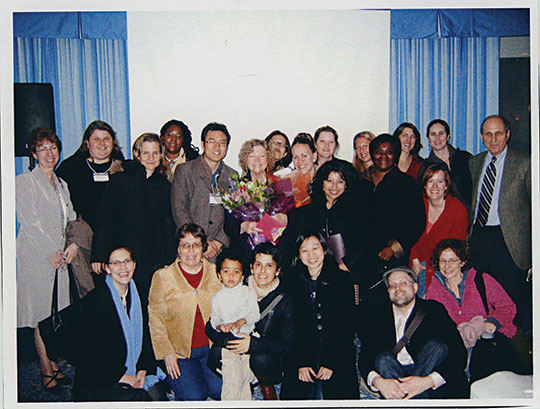Pondering Identity, Among Others
For nearly a decade, the String Group gave a handful of students the space to work through their ideas
For nearly a decade, the String Group gave a handful of students the space to work through their ideas
By Joe Levine
Among the various gatherings Janet Miller has initiated over the years, the String Group—so named because of the way discussions always seemed to take shape as a chain of related ideas—stands out for its focus on negotiating different worlds. The Group—a handful of Miller’s doctoral students who began working with her as far back as 2003—brings together a particularly varied cast. Mary Rojas (M.A., ’02), who completed her dissertation last spring and currently works for TC’s Vice President for Finance and Administration, was born in Colombia and moved to Los Angeles at age 10. She wrote about the ways in which high school literature anthologies present limiting constructions of Latino cultures and identities. Chinelo Achebe-Ejueyitche (Ed.D., ’10; Ed.M., ’07), daughter of the great Nigerian writer Chinua Achebe, wrote about the challenges of autobiographical inquiry as she explored living in the United States as a Nigerian woman and as the daughter of a famous writer with his own, already publicly determined identity. Mary Sefranek (Ed.D., ’06), who is white and of Slovak descent but who has spent years living and working in Puerto Rican and Dominican communities, wrote about multi-modal ways of incorporating the work of Latino authors into high school classrooms. And Joe Lewis (Ed.D., ’06), who had taught in Morocco as part of his service in the Peace Corps and who returned for his semester-long dissertation field study, focused on issues of representing, from a Western perspective, the communication strategies of Moroccan men.
“The group really enabled us to develop as young scholars—to develop our ideas together over time and to work through poststructuralist, feminist theory,” says Sefranek, who now teaches at the University of Puerto Rico. “Because you don’t just read those ideas and get them. You grapple with them over the course of an academic career.”
For Rojas, whose cultural identity living in California was often defined by others within the generalizing term “Latino” or the regional label “Mexican-American,” the work of the group was at times “torture—a constant challenge,” but also “a place of peace and comfort.
“I came in feeling constrained by the dominant discourse of Latino identity—I was attracted to the group because it provided a space to play with our ideas and question constantly through our talks, writings and presentations, those limiting discourses that positioned Latino identities in limiting ways,” she says.
One hallmark of the group was its focus on recreating, at academic conferences, its own live discussions—work that the members call “performative” rather than “performance”—and then opening up those recreations to questioning and analysis.
“Of course, it never came out the same way twice, and that became the point,” says Sefranek. “Different responses would emerge. It was a bit nerve-wracking, because it’s not easy to process poststructural thinking in front of a live audience, but it was phenomenal. People would come up to us at conferences and say, ‘I saw you in Chicago two years ago, and it’s fascinating to see how your reflections and research have continued to evolve.’”
As members of the group began leaving New York to take jobs elsewhere, String Group presentations began incorporating elements like speaker phones as props. Currently, after several years, the group is no longer actively presenting at conferences. But for all the members, the experience continues to resonate.
“As a junior faculty member, you realize that the space of doctoral study is very special and hard to recapture,” says Sefranek. “I hope to recreate the space that Janet gave us, and in some ways I have. There was a historic student strike here in Puerto Rico in 2010, and I subsequently began to meet with a group of young women who had participated. It’s not the same as the String Group—significantly, the group was initiated by the students themselves—and it’s hard not to try to recreate that experience exactly. Yet an important facet of poststructuralism is that things aren’t fixed, that they
necessarily change.”
Published Friday, May. 20, 2011
